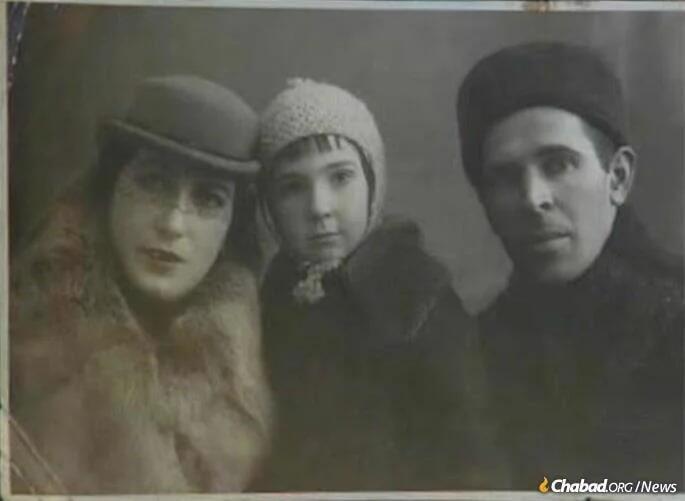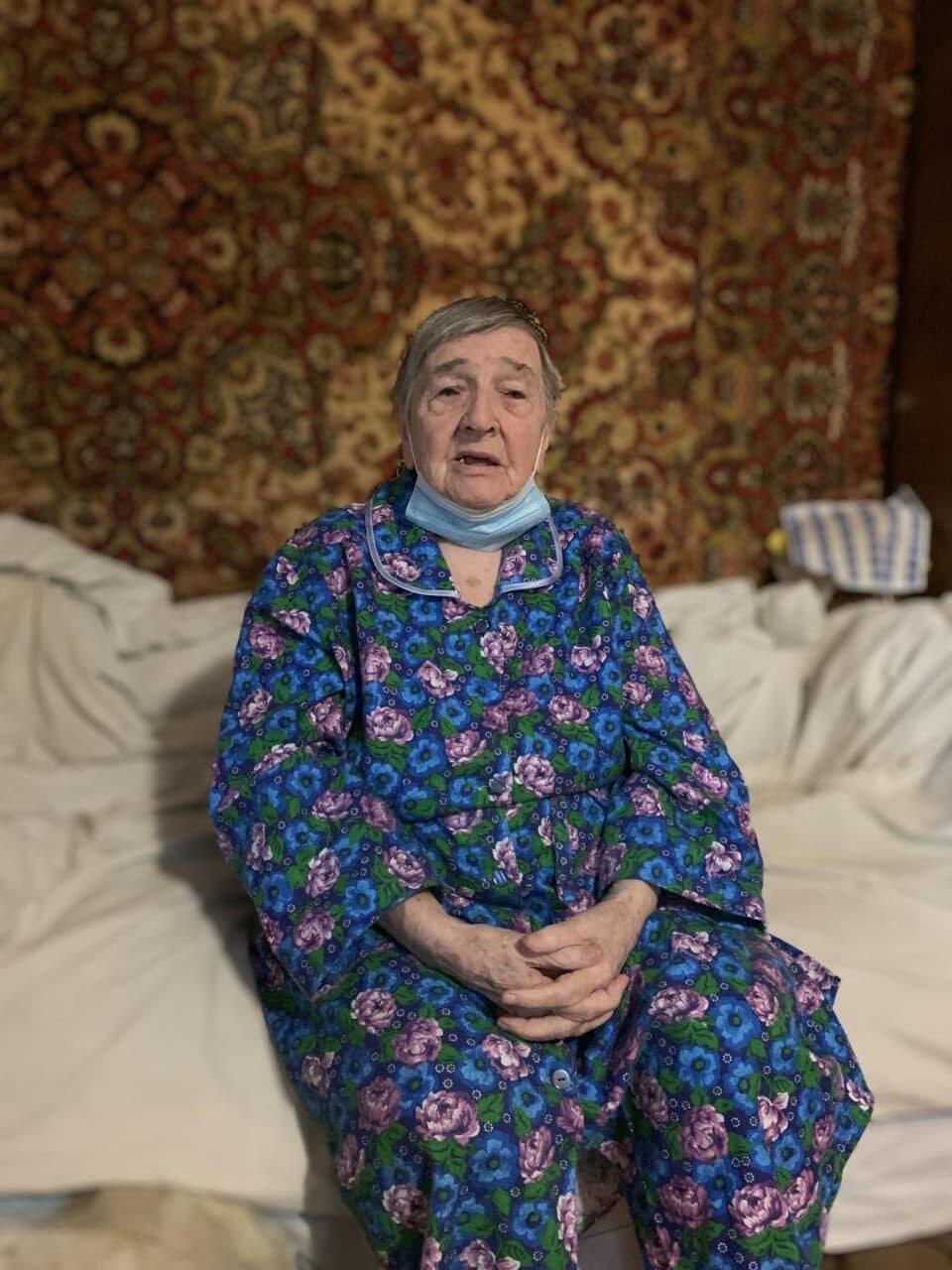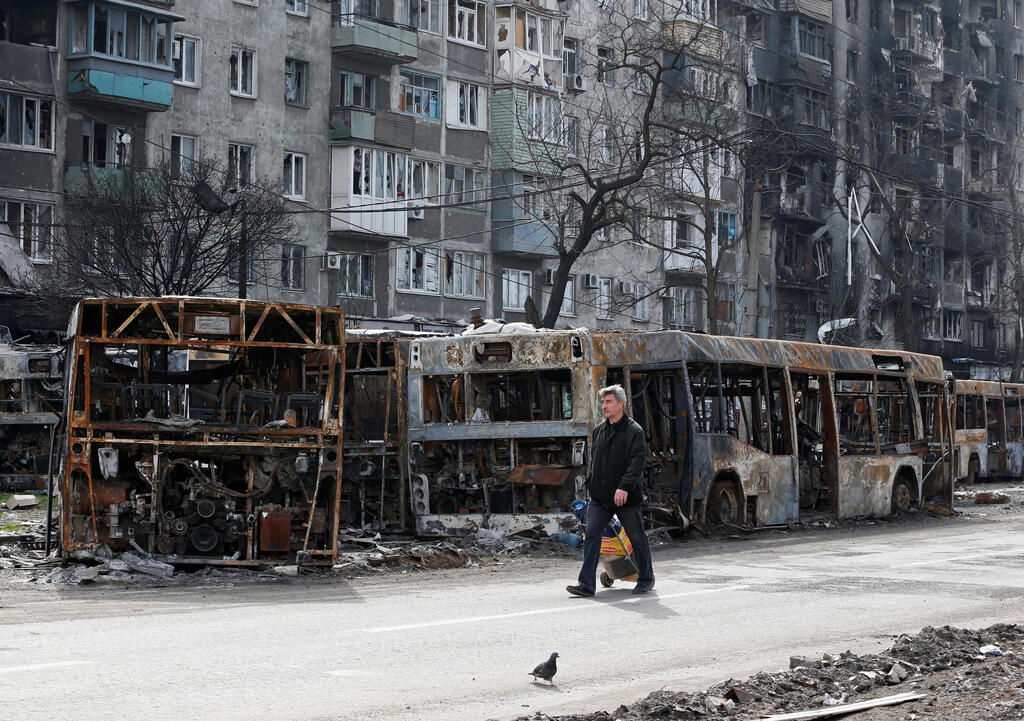Eighty years after she escaped occupying Nazi forces as a ten-year-old girl, Wanda Semionovna Obiedkova slowly withered away in a damp cellar in the besieged Ukrainian city of Mariupol, hiding from constant Russian bombardments, until she died.
The 91-year-old Holocaust survivor fell ill in her final two weeks and could not even stand on her feet. She was freezing, starving, parched and begging for water.
"Mother did not deserve to die like this," her daughter, Larissa, a doctor by profession, told Ynet.
During those two weeks, Larissa stayed by her mother's side and described the hell her mother went through — without food, without medicine and with great fear of the incessant Russian bombings.
"There was terrible cold and hunger in the basement. Mother could not shower, nor change clothes," she said.
Obiedkova died about two weeks ago in the cellar where she was hiding with her family. Her daughter, who remained by her side until the last minute, risked her life to bury her during the nonstop shelling.
The daughter says her mother "was hastily buried, under fire. She was buried in a park near the house, not in a proper cemetery."
Larissa and her family were finally evacuated to safety this week, but she says she intends to return to Mariupol as soon as possible to bury her mother in an orderly fashion.
"The daughter, Larissa, watched Wanda slowly dying and told us in tears all the details. It's heartbreaking," said Rabbi Mendel Cohen, the chief rabbi of Mariupol, the bombed-out city that has become a symbol of the war in Ukraine.
"All Wanda could dream of in her final two weeks was just water," she told the Chabad.org magazine.
'Mariupol has become one massive cemetery'
With the onset of fighting in the city at the top of March, the family moved into the cellar of a nearby store and the only assistance they received throughout the war came from Rabbi Cohen's synagogue and community center.
"There was no water, no electricity, no heating, and it was unbearably cold," Larissa said. "We could do nothing for her. We lived like animals."
Larissa said two snipers set up positions by the nearest water sources, making any trip there very dangerous, in addition to the bombs raining from above.
"Every time a bomb fell, the whole building shook," she said. "My mother kept saying she did not remember anything like this, not even during World War II."
Obiedkova was born in Mariupol in 1930. She was ten in October 1941 when the Nazis marched into the city and started rounding up all the Jews. When they arrived at the family home, the Nazis took Wanda's mother, Maria (Mindle), but the little girl hid in the basement and managed to escape.
On October 20, 1941, the Germans executed between 9,000 and 16,000 Jews in the death pits on the outskirts of Mariupol, including Obiedkova's mother and her entire family.
The little girl was later arrested, but friends of the family managed to convince the Nazis she was Greek. She eventually arrived at a hospital, where she remained until the liberation of Mariupol in 1943.
"Mariupol has become one massive cemetery," said Rabbi Cohen, director of the Chabad House and rabbi of the Ukrainian port, which is being pulverized by Russian forces. According to him, Obiedkova and her family were active members of the city's Jewish community.
'We fear for everybody's fate'
Since the beginning of the war, Rabbi Cohen has been working around the clock to evacuate community members from the inferno, even on Shabbat and Seder night. This week, he finally managed to get Larissa and her family to safety.
3 View gallery


Obiedkova with her parents Maria (Mindle) and Semion, before World War Two
(Photo: Chabad. org)
In recent weeks, Rabbi Cohen has received no less than 1,840 requests from Jewish families who were seeking a way out of the city.
"Communications are down all over the city," he said. "Even those who manage to get out, we can't communicate with them. They are screened by the Russians, and it takes time to make contact. I know that at least 500 families have already left. As for the rest, it is not clear where they are, and we fear for everybody's fate."
Rabbi Cohen further said that the entire Jewish community in Mariupol was in deep grief over the passing of Obiedkova, who everybody knew and who became a symbol for surviving the Nazi occupation of Mariupol in 1941-1943.
"She hid in cellars and trenches from the Nazis who shot her family. Who would have thought that 80 years later, Wanda would starve to death in a cellar in Mariupol," he said.
"She was a brilliant and kind person who will forever remain in our memory and our hearts. All these years, she always told her story from the Holocaust, and her testimony was chilling."



